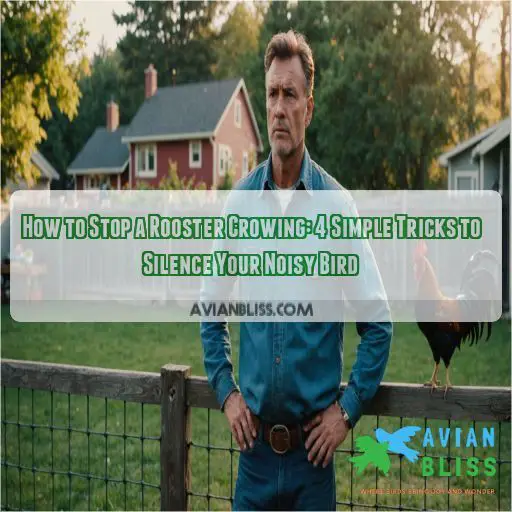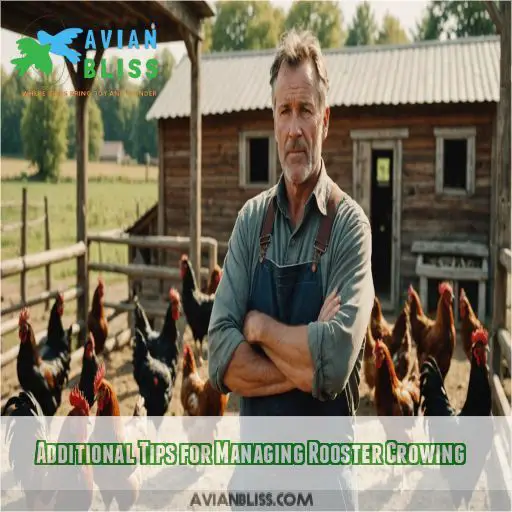This site is supported by our readers. We may earn a commission, at no cost to you, if you purchase through links.

To stop a rooster crowing, try these simple tricks.
First, make sure his basic needs are met: consistent food, fresh water, and a clean coop.
A bored rooster is a loud one, so provide toys and mental stimulation.
You can also use a rooster collar to reduce the noise.
But before you do, investigate why he’s crowing excessively – is he stressed, sick, or just showing off?
Addressing the root cause can make all the difference.
And trust me, a quieter rooster is just the beginning – there’s more to mastering the art of rooster whispering!
Table Of Contents
- Key Takeaways
- Why Do Roosters Crow So Much?
- Reducing Crowing Through Lifestyle Changes
- Physical Measures to Stop Rooster Crowing
- Enriching Your Rooster’s Life to Reduce Crowing
- Additional Tips for Managing Rooster Crowing
- Frequently Asked Questions (FAQs)
- How do you stop a rooster crowing?
- What happens if a rooster crows a lot?
- Does a rooster collar stop crowing?
- How do you reduce crowing noise in a rooster coop?
- How can I shut a noisy rooster up?
- Is there a device to stop roosters from crowing?
- How do you calm a crowing rooster?
- Do anti-crow collars work?
- Can Roosters Be Trained Not to Crow at Night?
- Do All Rooster Breeds Crow Equally Loud and Frequently?
- How Long Does a Rooster Typically Crow Each Time?
- Are Roosters More Likely to Crow in Certain Weather?
- Can Roosters Learn to Imitate Other Sounds Instead? How often do roosters crow in a typical day?
- Can roosters fly away if they are not kept enclosed?
- Will feeding chickens meat turn them into cannibals?
- Do hens have combs and wattles like roosters do?
- How do roosters fertilize eggs without a penis?
- Conclusion
Key Takeaways
- You don’t have to be a chicken whisperer to stop your rooster’s incessant crowing – just make sure his basic needs are met, including consistent food, fresh water, and a clean coop. Trust us, a happy rooster is a quieter rooster!
- Don’t be too quick to grab that rooster collar just yet – Don’t be too quick to grab that rooster collar just yet, investigate why your feathered friend, like the Northern Cardinal behaviors, is making such a racket.
. Is he stressed, sick, or just showing off? Addressing the root cause can make all the difference in reducing the noise.
- A bored rooster is a loud rooster, so keep him entertained with toys and mental stimulation! Think puzzle feeders, hidden treats, and interactive games – your neighbors will thank you.
- If you’re at your wit’s end with your rooster’s non-stop crowing, don’t worry – there’s more to mastering the art of rooster whispering than just reducing the noise. By enriching his life and understanding his behavior, you’ll be well on your way to a more harmonious backyard.
Why Do Roosters Crow So Much?
You’re probably here because your rooster’s incessant crowing is driving you (and your neighbors) crazy – but before we can stop the noise, we need to understand why they’re making it in the first place (Source).
It turns out, It turns out, roosters crow for a variety of reasons, including: Establishing Dominance Hierarchy
, including:
- Establishing dominance
- Warning of predators
- Communicating with hens and other roosters
- Boredom
- Even just because they’re stimulated by light (Source).
Establishing Dominance and Warning of Predators
The age-old question: why do roosters crow so much? Well, it’s partly about establishing dominance and warning those pesky predators to stay away. Your rooster is like a little sheriff, keeping his flock safe and in line.
- He’s showing off his strength and virility to potential competitors
- Warning hens of potential threats, like hawks or foxes
- Defending his territory from other roosters
- Maintaining social hierarchy within the flock
- Keeping his hens in line, because, let’s face it, someone’s gotta be in charge
Communicating With Hens and Other Roosters
You’ve probably noticed your rooster "talking" to his hens and fellow roosters – and that’s exactly what he’s doing! Roosters use crowing to communicate with their flock, signaling food, warning of predators, and even gossiping with other roosters. By understanding their language, By understanding their rooster behavior and body language, you can better manage their crowing and create a harmonious backyard flock.
.
Boredom and Unhappiness
Let’s face it – a bored rooster is a loud rooster! If your feathered friend is crowing excessively, it might be due to a lack of stimulation. Provide rooster toys, hidden treats, and new environments to explore. A mobile coop can be a game-changer! By enriching your rooster’s life, you’ll reduce boredom and, subsequently, those ear-piercing crows.
Stimulated by Light
You’ve tackled boredom and unhappiness, now let’s shine a light on another crowing culprit: light stimulation. Roosters rely on natural light cues to regulate their internal clock, which can trigger crowing. Artificial lighting can confuse them, making them crow more. Control the light cycle, and you’ll be one step closer to a quieter morning.
Reducing Crowing Through Lifestyle Changes
You’re probably tired of your rooster’s incessant crowing, but before you consider drastic measures, try making some simple lifestyle changes to reduce the noise. By tweaking your rooster’s daily routine, environment, and social dynamics, you can minimize crowing and create a more harmonious backyard .
Providing Consistent Food and Water
Consistently providing food and water is key to reducing your rooster’s crowing. Here are four simple tips to get you started:
- Establish a feeding schedule: Feed your rooster at the same times every day to create a routine.
- Ensure access to fresh water: Make sure your rooster always has clean drinking water available.
- Store food properly: Keep food in a dry, secure area to prevent spoilage and pests.
- Keep the chicken run clean: Regularly clean the chicken run to prevent disease and stress.
Minimizing Nighttime Crowing
Now that you’ve got your rooster’s meals on track, let’s tackle those midnight concerts. To minimize nighttime crowing, make sure the coop is dark, quiet, and predator-proof. Control light exposure with blackout curtains or shades. A stress-free rooster is a quieter rooster, so make sure your Polish or Silkie chicken has a cozy spot to snooze.
Avoiding Crowing Competitions
The never-ending battle for dominance. To avoid crowing competitions, keep only one rooster in the coop. Trust us, it’s worth it. Single-rooster households are generally quieter and less stressful. If you do have multiple roosters, make sure the coop is large enough to reduce territorial behavior. A good rule of thumb is 10 hens per rooster.
Regulating Light Exposure
You’re probably aware that roosters rely on natural light cues to regulate their internal clock. By manipulating the light cycle, you can trick your rooster into thinking it’s still daylight when it’s dark. Use a blackout box or automated lighting system to control the light exposure, and you might just find your rooster’s crowing decreases a lot.
Physical Measures to Stop Rooster Crowing
You’re ready to try some hands-on approaches to quiet down your loud rooster – let’s explore the physical measures that can help reduce the crowing. From rooster collars to more, um, "drastic" measures (spoiler alert: we don’t recommend those!), we’ll walk through the options that can help you – and your neighbors – get some peace and quiet.
Surgical Alterations (Not Recommended)
The desperation to silence a noisy rooster! You might be tempted to think about surgical alterations, but hold on to your feathers – it’s not recommended. Here are 3 reasons why:
- Inhumane treatment: Surgery can be painful and traumatic for your rooster.
- Costly and unnecessary: There are alternative methods that are more humane and cost-effective.
- Long-term health risks: Surgery can lead to unforeseen health complications, similar to the risks associated with Eating Wild Seagulls.
: Surgery can lead to unforeseen health complications.
Using Rooster Collars to Reduce Noise
If surgery’s not your thing (and we don’t blame you!), a rooster collar can be a more humane way to reduce the noise. These collars restrict airflow when your rooster crows, making the sound quieter. You can buy one or even make your own using double-sided Velcro. It’s a simple, non-invasive solution to give you (and your neighbors) some peace.
Fitting and Adjusting the Collar
Now that you’ve got your rooster collar, it’s time to put it to use! Place the collar low on your rooster’s neck, ensuring a snug but not restrictive fit. Start with a loose fit and gradually tighten it over time, rewarding your rooster with treats. Regularly check the collar’s fit and adjust as needed, especially for young roosters.
Enriching Your Rooster’s Life to Reduce Crowing
You’re probably at your wit’s end with your rooster’s non-stop crowing, but don’t worry, enriching his life can be a game-changer. By providing mental stimulation for birds, creating a mobile coop, and ensuring a healthy rooster-to-hen ratio, you can reduce your rooster’s crowing and create a more harmonious backyard.
, creating a mobile coop, and ensuring a healthy rooster-to-hen ratio, you can reduce your rooster’s crowing and create a more harmonious backyard.
Providing Mental Stimulation and Toys
Now that we’ve explored physical measures to reduce crowing, let’s talk about keeping your rooster’s mind busy. Providing mental stimulation and toys can be a game-changer. Think puzzle feeders, hidden treats, and interactive games. These boredom busters will keep your rooster engaged and entertained, reducing the need to crow. Get creative with enrichment ideas and watch the noise level drop!
Creating a Mobile Coop for Exploration
Now that you’ve got your rooster’s mind stimulated with toys, it’s time to get him moving – literally! A mobile coop can be a game-changer for reducing crowing. Design a safe and sturdy coop using durable materials, and move it around regularly to give your rooster new sights and smells to explore, keeping him engaged and quiet.
Increasing the Number of Hens in the Flock
Adding more hens to the flock can be a game-changer for reducing your rooster’s crowing. With more ladies to attend to, he’ll be too busy to make a racket. Here are some benefits of increasing the number of hens:
- Reduces competition and stress among hens
- Creates a more natural social hierarchy
- Keeps your rooster occupied and engaged
- Can lead to a decrease in crowing due to a more balanced flock dynamic
Maintaining a Healthy Rooster-to-Hen Ratio
Now that you’ve added more hens to the flock, it’s time to make sure the hen-to-rooster ratio is just right. Aim for 10 hens per rooster to reduce aggression and stress. A balanced flock dynamic will keep your hens happy and healthy.
| Ratio | Benefits |
|---|---|
| 10:1 | Reduced rooster aggression |
| 10:1 | Improved hen health |
| 5:1 | Increased brood size |
This magic number will also reduce crowing, as your rooster will be too busy strutting his stuff to squawk all day.
Additional Tips for Managing Rooster Crowing
You’ve tried the lifestyle changes, physical measures, and enrichment techniques, but your rooster is still crowing loudly.
Don’t worry, there are a few more tricks up your sleeve to help manage the noise.
From investigating the reasons behind the excessive crowing, similar to understanding why crows become aggressive, to playing soothing music, these additional tips will help you silence your noisy bird and bring some peace back to your backyard.
, these additional tips will help you silence your noisy bird and bring some peace back to your backyard.
Investigating Reasons for Excessive Crowing
If your rooster’s excessive crowing is driving you crazy, it’s time to play detective. Check for predator threats, like a sly fox lurking around the coop. Make sure the coop environment is comfortable and stress-free. Rule out health concerns and consider your rooster’s age – young roosters tend to crow more. Identify the stress factors and address them.
Playing Music to Calm the Rooster
- Nature sounds: Rainy days or ocean waves can create a soothing atmosphere.
- Classical music: Composers like Mozart can calm your bird’s nerves.
- Traditional African music: Who knows, your rooster might’ve a hidden love for Afrobeat!
Managing Stress and Anxiety in Roosters
Now that you’ve tried playing music to calm your rooster, let’s tackle stress and anxiety. Just like us, roosters get frazzled too!
| Stress Triggers | How to Help | Benefits |
|---|---|---|
| Predator threats | Secure coop design | Reduces fear |
| Lack of hens | Increase hen interaction | Boosts socialization |
| Poor diet | Balanced nutrition | Improves mood |
Monitoring for Potential Health Issues
Now that you’re on top of managing your rooster’s stress, it’s time to keep an eye out for potential health issues.
A sick rooster can crow excessively, so monitor for signs of illness like labored breathing, lethargy, or changes in droppings.
Regular vet visits, a balanced diet, and a clean coop can help prevent health problems and keep the crowing to a minimum.
Frequently Asked Questions (FAQs)
How do you stop a rooster crowing?
Imagine this: a peaceful morning, sans ear-piercing crowing. You can achieve this bliss by providing your rooster with a stimulating environment, consistent food and water, and a comfy coop – happy rooster, less crowing!
What happens if a rooster crows a lot?
If your rooster‘s crowing a lot, it may be trying to establish dominance, warning of predators, or just plain bored! Don’t worry, it’s normal – roosters crow around 10-20 times a day, but excessive crowing can be managed.
Does a rooster collar stop crowing?
You’re wondering if a rooster collar can stop crowing? Well, it won’t completely silence your loudmouthed friend, but it can reduce the volume by restricting airflow to the voice box .
How do you reduce crowing noise in a rooster coop?
Like a maestro fine-tuning an orchestra, you can reduce crowing noise in a rooster coop by adding sound-absorbing materials, using white noise machines, or simply moving the coop to a quieter spot on your property.
How can I shut a noisy rooster up?
To shut a noisy rooster up, try addressing the underlying reasons for its crowing, such as boredom or dominance. Provide mental stimulation, make sure you have a balanced flock, and consider a rooster collar to reduce the noise.
Is there a device to stop roosters from crowing?
Hold your horses, partner! While there isn’t a magic device to completely silence a rooster, you can try using a rooster collar to reduce the volume of their crowing. It’s not a silver bullet, but it’s worth a shot!
How do you calm a crowing rooster?
You can calm a crowing rooster by checking for stressors, ensuring adequate food, water, and space, and providing mental stimulation through toys and activities. Sometimes, simply spending time with him can calm him down!
Do anti-crow collars work?
You’re at your wit’s end with that loud rooster, aren’t you? Anti-crow collars can be a lifesaver! By restricting airflow to the voice box, they reduce the volume of crowing, giving you (and your neighbors) a much-needed break.
Can Roosters Be Trained Not to Crow at Night?
You can train your rooster to reduce nighttime crowing by establishing a consistent sleep schedule, keeping him calm with a relaxing coop environment, and using enrichment activities to keep him occupied during the day.
Do All Rooster Breeds Crow Equally Loud and Frequently?
It turns out that 90% of a rooster’s crowing happens during daylight hours! As for breed variations, some roosters are naturally more vocal than others – like the loudmouthed Leghorns – but all breeds can be prone to excessive crowing if bored or stressed.
How Long Does a Rooster Typically Crow Each Time?
Don’t worry, a rooster’s crowing sessions are relatively short-lived. Typically, a rooster crows for around 5-10 seconds at a time, with some loud and proud ones going up to 20 seconds – but that’s about it!
Are Roosters More Likely to Crow in Certain Weather?
You might notice your rooster crows more during certain weather conditions, like sunny mornings or changes in temperature . Some roosters may also crow more during windy or stormy weather, possibly due to the increased noise and stimulation .
Can Roosters Learn to Imitate Other Sounds Instead? How often do roosters crow in a typical day?
Get ready for a surprise! Roosters crow around 10-20 times a day, and it’s not just about making noise. But, can they learn to imitate other sounds? Let’s take a closer look and find out!
Can roosters fly away if they are not kept enclosed?
Don’t worry, your feathered friend won’t fly the coop – literally! Roosters can lift off the ground, but they’re not exactly built for long-distance flights. You can breathe easy, they’ll stick around, even without an enclosure.
Will feeding chickens meat turn them into cannibals?
Don’t worry, feeding chickens meat won’t turn them into cannibals! Chickens are omnivores and can eat meat, but they won’t develop a taste for their own kind. Their dietary needs are different from their social behaviors, so you’re safe to provide a varied diet .
Do hens have combs and wattles like roosters do?
You’re probably wondering, do hens have combs and wattles like roosters do? Yes, they do! Both hens and roosters have combs and wattles, although roosters’ are usually larger and more vibrant, especially on their faces.
How do roosters fertilize eggs without a penis?
You’re curious about rooster romance! Despite not having a penis, roosters fertilize eggs through a process called ‘cloacal kissing,’ where they press their cloaca (a multi-purpose opening) against the hen’s cloaca, transferring sperm.
Conclusion
Did you know that a rooster’s crowing can reach levels of up to 130 decibels?
That’s louder than a chainsaw!
Now that you’ve learned how to address the root causes of your rooster’s incessant crowing, you’re well on your way to a more peaceful backyard.
By implementing these simple tricks, you can reduce the noise and create a happier, healthier bird.
Mastering how to stop a rooster from crowing is just the beginning of your rooster-whispering journey!








